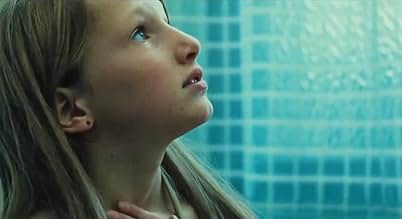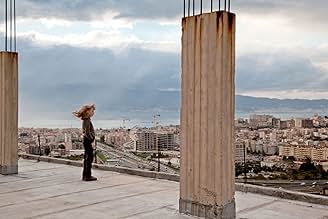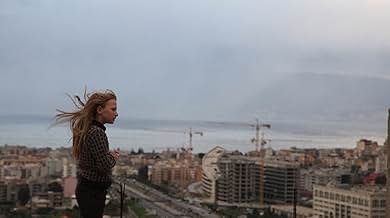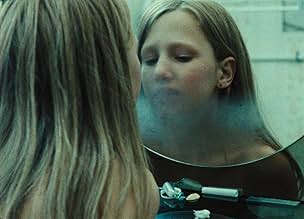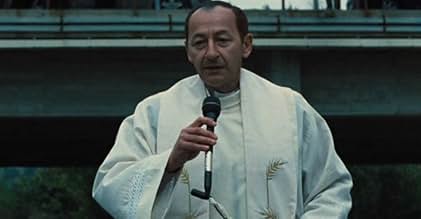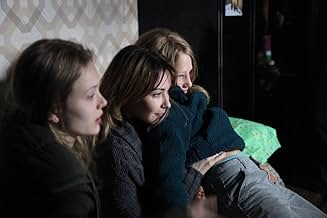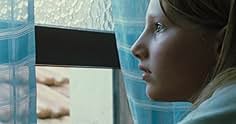AVALIAÇÃO DA IMDb
6,8/10
2,3 mil
SUA AVALIAÇÃO
Marta, de 13 anos, mudou-se recentemente para o sul da Itália com sua mãe e irmã mais velha e luta para encontrar seu lugar, testando incessantemente os limites de uma cidade desconhecida e ... Ler tudoMarta, de 13 anos, mudou-se recentemente para o sul da Itália com sua mãe e irmã mais velha e luta para encontrar seu lugar, testando incessantemente os limites de uma cidade desconhecida e o catecismo da Igreja Católica.Marta, de 13 anos, mudou-se recentemente para o sul da Itália com sua mãe e irmã mais velha e luta para encontrar seu lugar, testando incessantemente os limites de uma cidade desconhecida e o catecismo da Igreja Católica.
- Direção
- Roteirista
- Artistas
- Prêmios
- 10 vitórias e 10 indicações no total
Yile Yara Vianello
- Marta Ventura
- (as Yle Vianello)
Giovanni Federico
- Nino
- (as Gianni Federico)
Monia Alfieri
- Donatella
- (as Monica Alfieri)
Avaliações em destaque
After a slow start, I really enjoyed this one. Yle Vianello is wonderful as Marta, the earnest young girl about to go through the rite of confirmation in the Catholic Church. In a quiet way and without resorting to something like a story of priestly abuse, director Alice Rohrwacher gives us a powerful critique. She shows church leaders to be almost hopelessly far from Christ's precepts, and more interested in indoctrinating the young (in some cases with untranslated and unexplained dogma) and their own positions within the hierarchy than in real teaching. The drive from Reggio Calabria to the abandoned hill town to tussle over a crucifix seems like a perfect metaphor. I felt for Marta's coming-of-age alienation from her changing body, her mean older sister, and her crisis of faith. The subplot of the priest's assistant, a woman who finds out just how little she means in the patriarchy of the church, is also strong.
Marta(Yil Vianello) is a twelve-year-old girl preparing for her Confirmation at a church in Calabria. The waif-like kid has some serious questions about all that she is being taught to believe for her official entry into the Holy Apostolic Church.
The parish priest is seen gathering signatures in support of a local candidate for political office. So much for separation of church and state. He also has aspirations for a higher position within the Roman Church.
Meanwhile, the local children are seen at practice sessions for their special day. At sixty-five, I have little memory of my own Confirmation in the 1960s.
Vianello is a gem in the lead and pretty much carries this low-key but endearing slice of modern day Italian life.
The parish priest is seen gathering signatures in support of a local candidate for political office. So much for separation of church and state. He also has aspirations for a higher position within the Roman Church.
Meanwhile, the local children are seen at practice sessions for their special day. At sixty-five, I have little memory of my own Confirmation in the 1960s.
Vianello is a gem in the lead and pretty much carries this low-key but endearing slice of modern day Italian life.
This is the movie which can be discuss for years to come. A young pre-adolescent girl from Switzerland, where there is freedom of religion, who goes to Catholic dominated Italy to live with her Mother and older Sister who pesters her. Imagine the cultural shock of a contrast country. Add to this, the coming of adolescent age with its confusion and rebellion. Survival is challenging despite the indoctrination of a religious sense to keep people living within the teachings of the church. One sees a battle between moral values and self preservation. Plus, the struggle of an innocent child who wants to live the right way in a world that acts on human self righteousness and desires. This film will take you on a ride which leaves you in a hopeless state of not knowing who to believe or what to believe. Yet, among all the world lust, hypocritical situations, and unfairness... we can survive. We are a miracle. Especially when we put our faith in spiritual understanding. A thought provoking film which will question your own beliefs and understanding.
Alice Rohrwacher cannot disappoint.
If like myself, you have seen her latter films (and don't skip the documentary La Futura) - and are wonder-ing about seeing this film, rest assured even in her debut, you shall be rewarded.
This film is a little slower or more subtle perhaps than the others. Rohrwacher has not yet put her full faith in nature, but there are gusts of winds that sort of blow the (what else) young teenage female heroine through the town she has recently moved to.
In contrast to the church's literal formula, young Marta goes on her own pilgrimage. She is a misfit both in catechism and her sister's borrowed clothing. The viewer may have to be gentle with her and this film , but ultimately there is a lot going on. Trust in her, as in all of Rohrwacher's adolescent savants. The wisdom of the naif.
I feel like this could pair well with the more grandiose "The Mission." The film is not so much about religion, though it can feel that way. To me the tale is more about abandonment.
Amazing how the director connects a famous phrase from the Bible, Christ's cry - in Greek as part of the aforementioned formula, to the town of Roghudi Vecchio. There is also the subplot of Santa (the real spirit of the small church) and Don Mario (definitely the corporate/corporeal side) - and Santa fearing his abandoning.
There are religious tropes that tantalize through-out, walking on water, loaves and fishes, the blood of innocents - but do not be led into the temptation of trope tagging, instead enjoy the beauty of doubt, and the wrestling with abandonment.
Well that, and Rohrwacher's portrayal of adolescence as somehow more knowing and more flexibly real than rigid structures of catechism and capitalism and the other isms Rohrwacher so strongly distrusts.
If like myself, you have seen her latter films (and don't skip the documentary La Futura) - and are wonder-ing about seeing this film, rest assured even in her debut, you shall be rewarded.
This film is a little slower or more subtle perhaps than the others. Rohrwacher has not yet put her full faith in nature, but there are gusts of winds that sort of blow the (what else) young teenage female heroine through the town she has recently moved to.
In contrast to the church's literal formula, young Marta goes on her own pilgrimage. She is a misfit both in catechism and her sister's borrowed clothing. The viewer may have to be gentle with her and this film , but ultimately there is a lot going on. Trust in her, as in all of Rohrwacher's adolescent savants. The wisdom of the naif.
I feel like this could pair well with the more grandiose "The Mission." The film is not so much about religion, though it can feel that way. To me the tale is more about abandonment.
Amazing how the director connects a famous phrase from the Bible, Christ's cry - in Greek as part of the aforementioned formula, to the town of Roghudi Vecchio. There is also the subplot of Santa (the real spirit of the small church) and Don Mario (definitely the corporate/corporeal side) - and Santa fearing his abandoning.
There are religious tropes that tantalize through-out, walking on water, loaves and fishes, the blood of innocents - but do not be led into the temptation of trope tagging, instead enjoy the beauty of doubt, and the wrestling with abandonment.
Well that, and Rohrwacher's portrayal of adolescence as somehow more knowing and more flexibly real than rigid structures of catechism and capitalism and the other isms Rohrwacher so strongly distrusts.
While I loved the nuanced and sensitive performance of Yle Vianello as Marta, I couldn't help but feel that writer/director Alice Rohrwacher's portrayal of the Catholic church in Corpo Celeste was an overdrawn caricature – that only reinforced the usual stereotypes against institutional religion. In contrast, the almost intuitive spirituality Marta possesses – of gentleness towards others, wonder at creation, curiosity about the world + its people, reverence for the divine – those elements could have been connected to broad Christian doctrines of natural revelation, love for neighbor, and the work of the Spirit, but they were not. Though the ending makes Marta's journey beyond the film feel uncertain, somehow I'm convinced (if it is possible to extrapolate) that Marta will be ultimately alright in the end. She may not find truth in the unfortunate parish she finds herself in, but she's much closer to the Truth than almost everyone else in the film. We see this in the innocent delight over the kittens that she joyfully shares with her classmates. We see this in her desire to understand the phrase from her catechism recitation "Eli, Eli, Lama Sabachthani?" which she goes around repeating to herself without knowing the meaning. This forsaken uttering of Christ on the cross ironically rings quite true in Marta's life as she is mistreated by those in church leadership, cruelly bullied by her older sister, and witnesses powerlessly the brutal killing of the kittens. In spite of all the hypocrisy and vacuity of the parish, when Marta finds herself next to a huge dusty crucifix in a forsaken little village church, she instinctively uses her hands and shirt sleeve to gently and reverently wipe the dirt off the body of Christ. Somehow, in spite of it all, a real spirituality and an intimate relationship with Christ has been apprehended.
Principais escolhas
Faça login para avaliar e ver a lista de recomendações personalizadas
- How long is Corpo Celeste?Fornecido pela Alexa
Detalhes
Bilheteria
- Faturamento bruto nos EUA e Canadá
- US$ 8.919
- Fim de semana de estreia nos EUA e Canadá
- US$ 2.263
- 10 de jun. de 2012
- Faturamento bruto mundial
- US$ 347.600
- Tempo de duração1 hora 39 minutos
- Cor
- Mixagem de som
- Proporção
- 1.85 : 1
Contribua para esta página
Sugerir uma alteração ou adicionar conteúdo ausente



